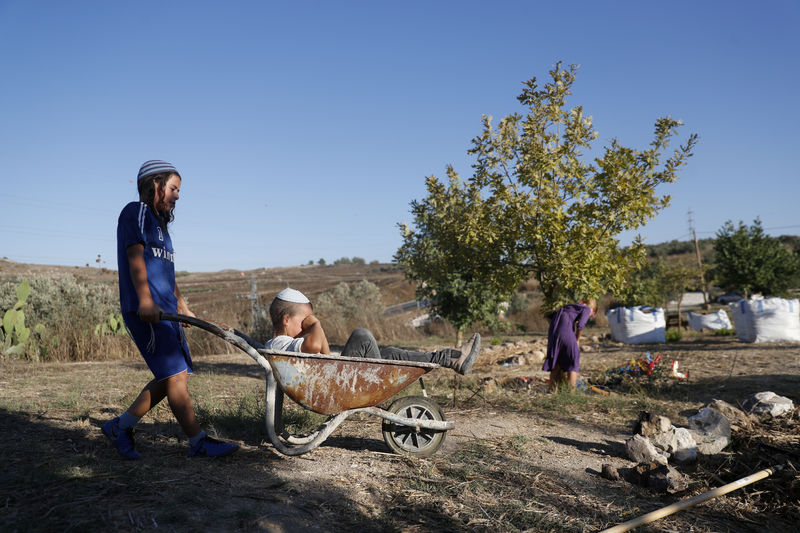By Maayan Lubell
OFRA, WEST BANK (Reuters) - His people's link to the land goes back to biblical times, says the comics illustrator. His neighbour, a farmer, says the land belonged to his ancestors and has been stolen. One is an Israeli settler, the other a Palestinian living across the road.
Israel's settlements in the occupied West Bank are one of the most heated issues in the Israeli-Palestinian conflict. The Palestinians want the area, captured by Israel in a 1967 war, for a future state.
The United States on Monday effectively backed Israel's right to build Jewish settlements in the territory by abandoning its four-decade-old position that they were "inconsistent with international law," a stance that may make Israeli-Palestinian peace even more elusive.
Israel has built more than 120 settlements in the West Bank, and Prime Minister Benjamin Netanyahu, in the run-up to an election in September, renewed his pledge to annex them, alarming the Palestinians.
Most of the international community sees the settlements as illegal and major obstacles to Israeli-Palestinian peace, a view Israel disputes.
Michael Netzer moved to Ofra in 1985, about a decade after the settlement was established, one of Israel's first in the West Bank.
"It’s ridiculous to say that Jews can’t live here," said the 63-year-old comics artist. "The Bible is a part of it. I would ask anybody: Is it so easy to lose your connection to your ancestors and your land? Of course it isn’t. For the Jewish people, that history is what made us what we are."
The red roofs of Ofra's homes are easily seen from Ein Yabrud, the Palestinian village across the road.
Azmi Musleh, 53, a local farmer, said Ofra sits on land his family used to cultivate.
"That land is my heart and soul. It is my family's heart and soul. We used to grow sesame, figs, olives, back to the time of my father, his father, and his father before him," Musleh said.
MAALE ADUMIM/AL-EIZARIYA
Israel's settler communities are hardly homogeneous. Some settlers are driven by burning ideology. Others are just looking for a cheap apartment. Some of the settlements adjacent to Israel are seen by many Israelis as just regular towns, unlike the more isolated enclaves deep inside the West Bank.
"I don't feel like a settler," said Michele Coven-Wolgel, a 60-year-old lawyer from Maale Adumim, a large settlement about 15 minutes' drive from Jerusalem. "Should we be annexed? Yes, we're a city of 41,000 people, we're a city, we have a mall."
Against the backdrop of desert hills, the villas of Maale Adumim provide their inhabitants with a comfortable life. Education is good and transport to the city is easy.
Ali Farun, 74, from the Palestinian town of al-Eizariya, about 1.5 km (one mile) from Maale Adumim has little hope of the territory ever coming under Palestinian control.
"It doesn't matter if they annex it to Jerusalem or if it remains West Bank - they control it, one way or another," said Farun.
HAVAT GILAD/SARRA
Havat Gilad, a cluster of prefab huts sprinkled across a hilltop deep in the West Bank, is home to about 45 families.
Its residents say their presence in the West Bank fulfils God's biblical promise to the Jewish people and secures Israel's safety.
"This belongs to the people of Israel, there's no question about it," said Itai Zar, 43, who founded Havat Gilad in 2002 after his brother was shot dead by Palestinian militants nearby.
"Eighteen years ago we came here, one family, and today we have a flourishing community."
Bothena Turabe, saw the settlement's growth from her Palestinian village Sarra, across the way.
"In the night you look at them and you think there is nothing, and the next morning you look and you see there are more caravans," said Turabe, 47, a member of the village council. "This land is not yours to take - you’re stealing it."
BEITAR ILLIT/WADI FUKIN
Beitar Illit is a settlement built for Israel's fast-growing ultra-Orthodox Jewish community.
According to Peace Now, an Israeli anti-settlements watchdog, Beitar Illit saw the most construction of all Israel's West Bank settlements in 2018.
Its densely built apartment blocs and Dollar stores seem a world apart from Havat Gilad's huts and dirt roads. And unlike in Zar, residents cite financial concerns for moving here.
"We're not here for ideological reasons," said David Hamburger, 36, a Beitar Illit shop owner. "There's no way for us to buy houses anywhere else besides settlements."
With large families, seven children on average, high unemployment and poverty, the ultra-Orthodox Jews seek cheap housing that will allow their close-knit community to live together.
For Mohammad Awad, a 64-year-old farmer from Wadi Fukin, a Palestinian village next to Beitar Illit, it makes no difference why people come to live in the settlement.
"It's impossible to have peace between us because the main conflict between us is on a piece of land which they took by force, so how can I let a person steal my land, live in it and enjoy it, and live with him in peace?" he said.

For the photo essay, click https://reut.rs/2m2Iekv